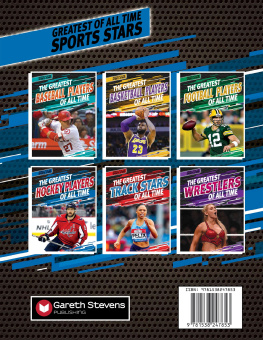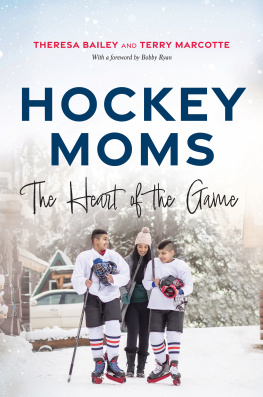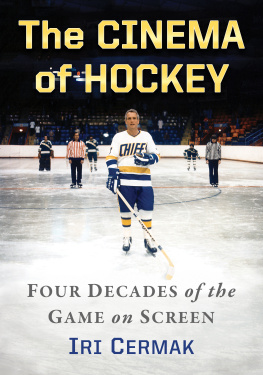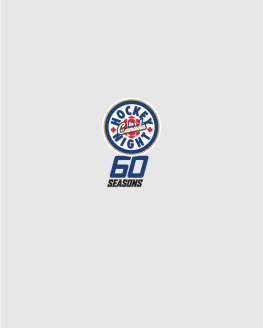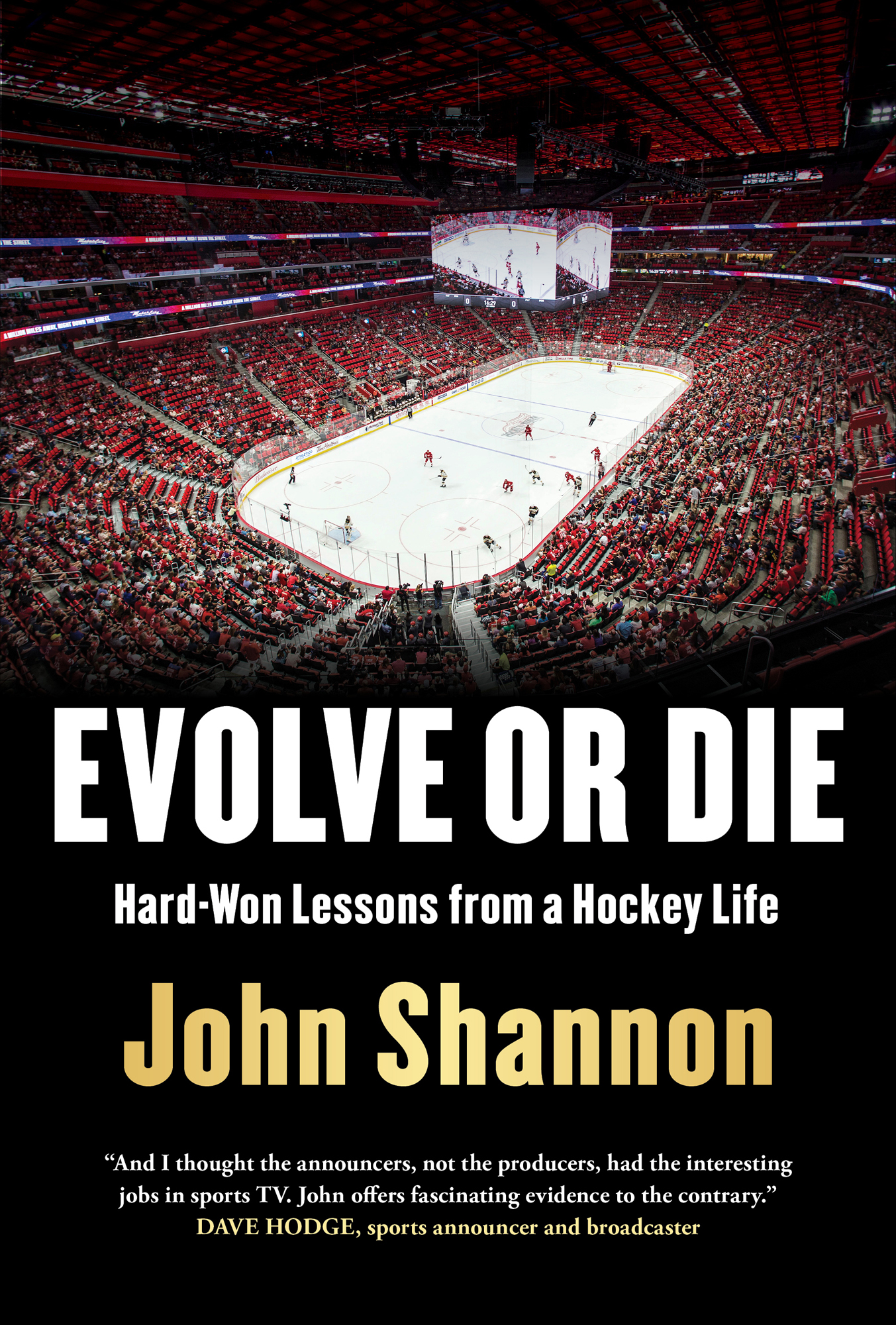Contents
Guide
Evolve or Die
Hard-Won Lessons from a Hockey Life
John Shannon
And I Thought the Announcers, not the Producers, had the Interesting Jobs in Sports TV. John Offers Fascinating Evidence to the Contrary.
Dave Hodge, Sports Announcer and Broadcaster

Simon & Schuster Canada
A Division of Simon & Schuster, Inc.
166 King Street East, Suite 300
Toronto, Ontario M5A 1J3
Copyright 2022 by Shannon Sports Media, Inc.
All rights reserved, including the right to reproduce this book or portions thereof in any form whatsoever. For information address Simon & Schuster Canada Subsidiary Rights Department, 166 King Street East, Suite 300, Toronto, Ontario, M5A 1J3.
This Simon & Schuster Canada edition October 2022
SIMON & SCHUSTER CANADA and colophon are trademarks of Simon & Schuster, Inc.
For information about special discounts for bulk purchases, please contact Simon & Schuster Special Sales at 1-800-268-3216 or .
Jacket Image Icon Sportswire
Library and Archives Canada Cataloguing in Publication
Title: Evolve or die : hard-won lessons from a hockey life / John Shannon.
Names: Shannon, John, 1956- author.
Identifiers: Canadiana (print) 2022021221X | Canadiana (ebook) 20220212228 | ISBN 9781982169015 (hardcover) | ISBN 9781982169022 (ebook)
Subjects: LCSH: Shannon, John, 1956-Anecdotes. | LCSH: HockeyAnecdotes. | LCSH: National Hockey LeagueAnecdotes. | LCSH: Hockey night in Canada (Television program)History. | LCSH: HockeyCanadaHistory. | LCSH: SportscastersCanadaBiography. | LCGFT: Autobiographies.
Classification: LCC GV848.5 .S525 2022 | DDC 796.962/092dc23
ISBN 978-1-9821-6901-5
ISBN 978-1-9821-6902-2 (ebook)
To Mickee, Jake, and Maja, who sacrificed much more than I ever did for me to play in the sandbox.
As you wish.
INTRODUCTION
FOR THE RECORD, I HAVE never worked a single day of my adult life.
Since the mid-1970s I have played in radio, television, and sportsand been paid for it. Quite frankly, it has been a dream come true. Never good enough to play the actual sports, I always was proud to go to the championship most years. Thats what it was all about. To be in the pressure of the moment with millions watching and, hopefully, enjoying the product. And knowing when the television show should not overshadow the actual event.
The media business of radio, television, and digital is not that difficult, really. We tend to make it difficult. It is the ability with words, pictures, and graphics to tell a story. A story to make the audience gasp, laugh, or cry. Its called the wow factor. I truly believe the philosophy that I have used in my work is simpler than most. Show the viewer how and tell them why. A commonsense approach, almost like a fairy tale.
Once upon a time the Good Prince rode in on a white stallion And they lived happily ever after.
In the sports television world, you have the challenge of telling that story in fifteen seconds, three minutes, fifteen minutes, or even the duration of a game. Every aspect of doing it right has a beginning, middle, and end. Once you grasp that simple concept, surviving in media becomes thriving in media.
Once upon a time becomes the close-up of the superstar centre. The Good Prince becomes the replay of his spectacular goal. And happily ever after becomes the celebration on the bench and the cheers of the home team crowd.
In televising the game of hockey, you have to know how to do that for one play, one period, one game, and perhaps a whole playoff series. It is that storytelling that was engrained in all of us at Hockey Night in Canada.
Working at HNIC meant feeling like a champion. You knew that the first day you started there. And everyone involved taught you that, every day after. A pride in doing it right. Spending hours perfecting the craft.
Our crew was always viewed as the third team in the arena. Our expectations and demands were as important, in our minds, as those of the two teams playing the game. We wore our uniform with pride. We played the game hard. We focused for the whole sixty minutes. And our ability to react to events on and off the ice, to create those wow factors, gave the audience a chance to enjoy the event that much more.
I wonder if my biggest strength in my career is that I dont think as an athlete. Too often in television, we say whats going on in the players mind (or in the room or on the bench). Thats why we have morphed the broadcast booth into a combination of professional broadcasters paired with former athletes. Some of those athletes, while very good at their jobs, often dont understand who they are talking to. The whys of an event are often communicated in such a manner that might be too technical. Not everyone in the audience played the sport they are watching. If you make an explanation too complicated, you arent doing the job properly. If you ever hear a doctor speak technically, you may not understand what the diagnosis of your ailment is. If the doctor gives it to you in laymans terms, you have a chance.
In television, the power to be the eyes of a fan anywhere in this country was energizing. Good, quality television is like winning the game. I likeno, I love to win.
There are many in the industry who view what we do as an art form. Im not one of them. I think the business we are in is much more of a conversation. And unlike those in the news industry, we are not deciphering current events or interpreting the latest from world leaders. We are, in fact, playing in the sandbox of life. We are following the exploits of modern-day gladiators. Rationalizing peoples passion for one team, or one sport, over another. Putting athletes on pedestals or knocking them off. And as much as the business is driven by technology, it truly is guided by the demand for perfection.
Sure, there were some emotional times, both personally and professionally. Actually, it is better to describe it as professionally personal. And I could be hard on people and hard on myself. Sometimes I crossed the line and paid for it. But it never stopped me from wanting to create great television and tell great stories. It never stopped me from wanting to be the bestand to win.
Technology has changed so much over the years. The digitization of the industry has made life much easier. But people havent changed, and its the people who have made our business. Managing peoplehelping, coaching, and watching them growis truly the greatest accomplishment of anyones career. Hoping they learn from you. Certainly, you learn from them. Wanting to be better and wanting those around you to be better.
And along the way, having some fun. Surely, we have to have fun. Thats what I want to tell you about in these pages. The joy inherent in how our business has changed, how watching the game has changed, and some of the great people Ive met along the way.
As of this writing, I am sixty-four years old, in my sixth decade of being in broadcasting, and around sports, particularly hockey. Its at this point that my wife, Mickee, interjects, You havent been in television sixty years. Since you were four!
No, I havent. But my career started in the glory years of Scotty Bowmans Montreal Canadiens in the mid-1970s. Through the Islanders, Oilers, Flames, Penguins, Red Wings, and every other Stanley Cup champion, I have witnessed or commented on six decades of triumphs, tragedies, and turmoil. It has been an unbelievable ride.


